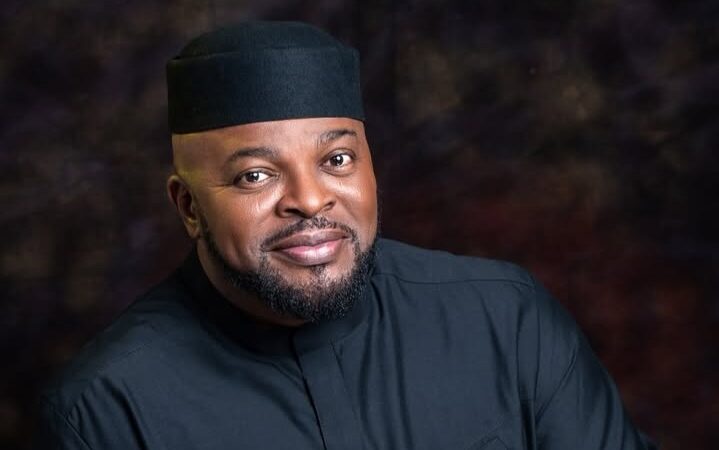Entertainment
Multiple Award Winning Producer, Composer, Quincy Jones Dies at 91

Quincy Jones, the multi-talented music titan whose vast legacy ranged from producing Michael Jackson’s historic “Thriller” album to writing prize-winning film and television scores and collaborating with Frank Sinatra, Ray Charles and hundreds of other recording artists, has died at 91.
Jones’ publicist, Arnold Robinson, says he died Sunday night at his home in the Bel Air section of Los Angeles, surrounded by his family.
“Tonight, with full but broken hearts, we must share the news of our father and brother Quincy Jones’ passing,” the family said in a statement. “And although this is an incredible loss for our family, we celebrate the great life that he lived and know there will never be another like him.”
Jones rose from running with gangs on the South Side of Chicago to the very heights of show business, becoming one of the first Black executives to thrive in Hollywood and amassing an extraordinary musical catalog that includes some of the richest moments of American rhythm and song. For years, it was unlikely to find a music lover who did not own at least one record with his name on it, or a leader in the entertainment industry and beyond who did not have some connection to him.
Jones kept company with presidents and foreign leaders, movie stars and musicians, philanthropists and business leaders. He toured with Count Basie and Lionel Hampton, arranged records for Sinatra and Ella Fitzgerald, composed the soundtracks for “Roots” and “In the Heat of the Night,” organized President Bill Clinton’s first inaugural celebration and oversaw the all-star recording of “We Are the World,” the 1985 charity record for famine relief in Africa.
Lionel Richie, who co-wrote “We Are the World” and was among the featured singers, would call Jones “the master orchestrator.”
In a career which began when records were still played on vinyl at 78 rpm, top honors likely go to his productions with Jackson: “Off the Wall,” “Thriller” and “Bad” were albums near-universal in their style and appeal. Jones’ versatility and imagination helped set off the explosive talents of Jackson as he transformed from child star to the “King of Pop.” On such classic tracks as “Billie Jean” and “Don’t Stop ‘Til You Get Enough,” Jones and Jackson fashioned a global soundscape out of disco, funk, rock, pop, R&B and jazz and African chants. For “Thriller,” some of the most memorable touches originated with Jones, who recruited Eddie Van Halen for a guitar solo on the genre-fusing “Beat It” and brought in Vincent Price for a ghoulish voiceover on the title track.
“Thriller” sold more than 20 million copies in 1983 alone and has contended with the Eagles’ “Greatest Hits 1971-1975” among others as the best-selling album of all time.
“If an album doesn’t do well, everyone says ‘it was the producers fault’; so if it does well, it should be your ‘fault,’ too,” Jones said in an interview with the Library of Congress in 2016. “The tracks don’t just all of a sudden appear. The producer has to have the skill, experience and ability to guide the vision to completion.”
The list of his honors and awards fills 18 pages in his 2001 autobiography “Q”, including 27 Grammys at the time (now 28), an honorary Academy Award (now two) and an Emmy for “Roots.” He also received France’s Legion d’Honneur, the Rudolph Valentino Award from the Republic of Italy and a Kennedy Center tribute for his contributions to American culture. He was the subject of a 1990 documentary, “Listen Up: The Lives of Quincy Jones” and a 2018 film by daughter Rashida Jones. His memoir made him a best-selling author.
Born in Chicago in 1933, Jones would cite the hymns his mother sang around the house as the first music he could remember. But he looked back sadly on his childhood, once telling Oprah Winfrey that “There are two kinds of people: those who have nurturing parents or caretakers, and those who don’t. Nothing’s in between.” Jones’ mother suffered from emotional problems and was eventually institutionalized, a loss that made the world seem “senseless” for Quincy. He spent much of his time in Chicago on the streets, with gangs, stealing and fighting.
“They nailed my hand to a fence with a switchblade, man,” he told the AP in 2018, showing a scar from his childhood.
Music saved him. As a boy, he learned that a Chicago neighbor owned a piano and he soon played it constantly himself. His father moved to Washington state when Quincy was 10 and his world changed at a neighborhood recreation center. Jones and some friends had broken into the kitchen and helped themselves to lemon meringue pie when Jones noticed a small room nearby with a stage. On the stage was a piano.
“I went up there, paused, stared, and then tinkled on it for a moment,” he wrote in his autobiography. “That’s where I began to find peace. I was 11. I knew this was it for me. Forever.”
Source: APnews
Entertainment
Popular Live Band Leader, Akin Shuga Dies at 50

Renowned Nigerian musician and live-band leader, Akinloye Tofowomo, popularly known as Akin Shuga, is dead.
The celebrated performer and founder of Shuga Band died on October 30, 2025, in New Brunswick, Canada, at the age of 50.
His family, in a statement on Monday, described him as a “revered music icon, grandmaster, and custodian of rhythm, culture, and the spirit of performance.”
The statement added, “Akinloye Tofowomo was more than a musician; he was a custodian of rhythm, culture, and the spirit of performance.
“Across more than three decades of excellence — on stage and in mentorship — he redefined what it meant to lead a band with grace, mastery, and purpose. To countless admirers at home and abroad, he was both an inspiration and an institution: a true king in his art.
“As the family comes to terms with this immeasurable loss, we humbly request privacy and quiet reflection at this deeply difficult time. We wish for the space to find closure and to honour his life in the intimacy of loved ones and cherished memories.
“Further details, including dates and arrangements for memorial observances, will be communicated in due course.
“We extend heartfelt appreciation to all who have reached out with prayers, tributes, and kind words. Akinloye Tofowomo’s legacy, through the Shuga Band and Shuga Entertainment, will continue to live on.”
Born on January 6, 1975, in Ile-Oluji, Ondo State, Akiin Shuga’s life was defined by resilience, passion, and purpose.
Stricken by polio at the age of five, he defied physical challenges to become one of Nigeria’s most accomplished live-band performers and music entrepreneurs. His story mirrored Nigeria’s own revival of live music as an essential part of its cultural identity.
In 1998, he founded the Shuga Band, which began performing at Pintos in Ikeja, Lagos. Over the years, the band grew into a 14-member ensemble known for its electrifying performances at weddings, corporate events, and state functions.
His company, Shuga Entertainment, became a model for professionalism and excellence in live performance, combining artistry with discipline.
Akiin Shuga also served as the founder and president of the Association of Music Band Owners of Nigeria, where he worked to elevate standards within the live-music industry and promote fair treatment for musicians.
Entertainment
Don Jazzy Names Top 5 All-time Afrobeats Songs, Albums

Mavin Records boss, Don Jazzy, has unveiled his list of favorite Afrobeats songs and albums, spotlighting the classics that propelled the genre from local streets to international acclaim.
In a RollingStone Africa interview, the producer paid homage to the Mo’ Hits era he co-built with D’Banj, while crediting pioneers who shaped the sound.
His top songs include 2Baba’s African Queen, which he said opened global doors for Afrobeats and Wizkid’s Ojuelegba for its authentic storytelling.
D’Banj’s Fall in Love earned praise as a continental anthem from Mo’ Hits, while 9ice’s Gongo Aso was lauded for blending Yoruba tradition with pop.
Davido’s Aye rounded out the list for its Highlife-infused energy.
For albums, Don Jazzy singled out Wande Coal’s Mushin 2 Mo’Hits, which he produced as a timeless masterpiece.
He also named 2Baba’s Grass 2 Grace, Wizkid’s Superstar, D’Banj’s The Entertainer, and Aṣa’s self-titled debut as foundational works that influenced today’s stars.
Entertainment
NBA Condemns Alleged Court Order Forcing TikTok Creators to Marry

The Nigerian Bar Association (NBA) has condemned an alleged order by a Magistrate Court in Kano State reportedly directing two social media content creators, Idris Mai Wushirya and Basira Yar Guda, to marry each other within 60 days.
The court directive reportedly followed a case against the duo over the circulation of a video deemed “indecent” by state authorities.
The content, which went viral on TikTok and other platforms, featured affectionate scenes between the two influencers.
The Kano State Films and Video Censorship Board claimed the video violated public morality and religious codes governing conduct in the state.
Magistrate Halima Wali reportedly handed down the marriage directive on Monday after arraigning the pair on charges relating to the production and distribution of obscene content online.
Reacting to the development, NBA President Afam Osigwe described the court order as a “grave misunderstanding of the limits of judicial authority under the Nigerian Constitution and constitutes an affront to the fundamental rights of the individuals concerned.”
Osigwe noted that no court has the power to compel any person to marry another person or two persons to mandatorily marry, adding: “It is indeed unconstitutional and therefore unlawful for any court to purport to have power to make such an order.”
He added that such an order would constitute a violation of several fundamental rights guaranteed under the 1999 Constitution of the Federal Republic of Nigeria (as amended).
“Marriage, by its very nature, is a voluntary union between consenting adults. It cannot, under any circumstance, be imposed as a form of punishment, moral correction, or judicial remedy.
“No court in Nigeria possesses the constitutional authority to compel two persons to marry, and any attempt to do so violates the rights to personal liberty, dignity of the human person, and privacy as guaranteed under the 1999 Constitution (as amended).”
The alleged order, according to the NBA president, is an example of judicial overreach that not only infringes on personal freedoms but also could undermine public trust in the legal system.
“The courts must remain the bastion of justice and protectors of constitutional rights, not instruments for enforcing social conformity or moral compulsion,” Osigwe added.
The NBA then called for an immediate review of this decision by Magistrate Halima Wali and urged the relevant judicial authorities to take steps to prevent a recurrence of such unconstitutional orders.
It also directed the NBA Citizens’ Liberties Committee and Women’s Forum to monitor the situation to ensure that the rule of law prevails.






